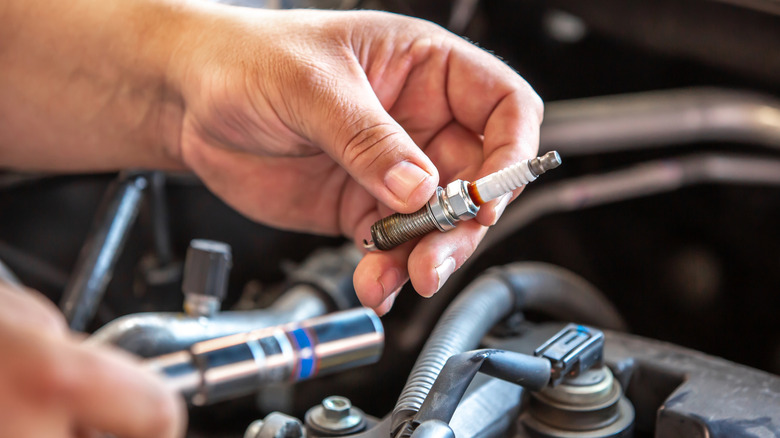Cheap Vs. Expensive Spark Plugs: Does Price Make A Difference?
We may receive a commission on purchases made from links.
Spark plugs have come a long way, as they're more durable and reliable than ever before. In fact, unlike most air filters and fluids that do require tune-ups every 30,000 miles, plugs can last up to 80,000 miles under the right conditions. However, if your car is guzzling more fuel than usual or has symptoms like rough idling or hard starting, it may be time to replace the plugs. Not only will bad spark plugs diminish your car's performance, but they'll also cause stall-outs, misfires, and jerky acceleration.
Of course, you can consider taking your car to your local auto mechanic. That said, replacing your car's spark plugs is a relatively easy DIY auto project that even beginners can tackle. A word of caution, though — don't dive in blind. All spark plugs share the same function: To ignite fuel and keep your engine running. However, when you start shopping for spark plugs, you will come across several different types with varying prices. Prices vary depending on the material used, with copper and nickel alloy plugs being the most affordable, and platinum and iridium plugs being at the high end of the price range.
Are expensive spark plugs really any better than cheap ones? At first glance, these tiny, screw-like parts may look the same on the outside. But spend your money on the wrong one — even if they fit — and you might be setting yourself up for costly repairs.
Why cheap spark plugs might be all you need?
Generally speaking, expensive spark plugs offer better performance and last longer than copper spark plugs. In fact, products that use materials like platinum, like the ACDelco 41-962 Professional Platinum Spark Plug from Amazon, can go hundreds of thousands of miles without requiring replacement. However, that doesn't mean you have to splurge on the most expensive spark plugs each time you want to complete a basic engine tune-up.
As it turns out, copper spark plugs — the most common and cheapest type — can still get the job done just like premium options. In fact, these plugs usually stand out because of their excellent conductivity and affordability. Excellent conductivity means they will ignite your engine quickly and consistently. The only downside is that they won't last long.
You'll also find that cheaper spark plugs are best suited for vehicles with low-performance engines. If you have a fuel-efficient sedan or a vintage car, iridium spark plugs won't enhance the car's horsepower or efficiency enough to justify the cost. So, you could end up shelling out $62 on a premium option, when a cheaper option will deliver reliable performance for less.

